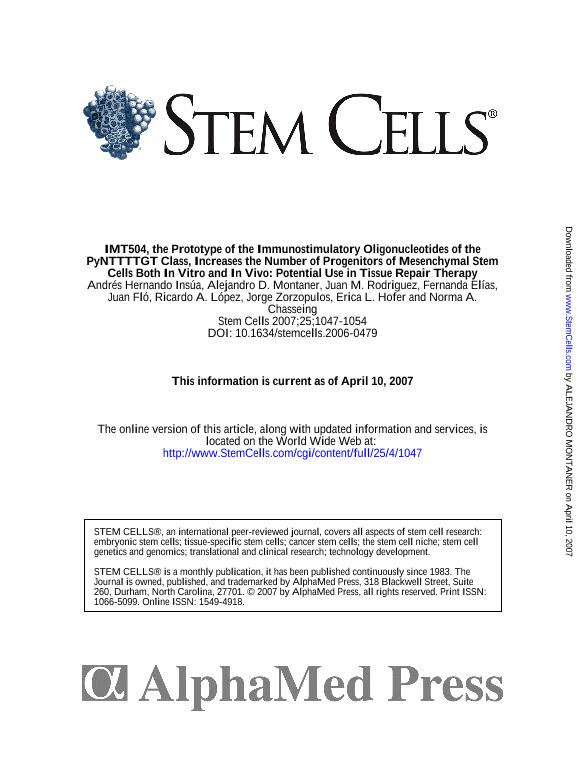Mostrar el registro sencillo del ítem
dc.contributor.author
Hernando Insúa, Andrés
dc.contributor.author
Montaner, Alejandro Daniel

dc.contributor.author
Rodriguez, Juan Manuel

dc.contributor.author
Elías, Fernanda
dc.contributor.author
Fló, Juan
dc.contributor.author
López, Ricardo A.
dc.contributor.author
Zorzopulos, Ricardo A.
dc.contributor.author
Hofer, Erica L.
dc.contributor.author
Chasseing, Norma Alejandra

dc.date.available
2018-04-15T12:08:30Z
dc.date.issued
2007-04-25
dc.identifier.citation
Hernando Insúa, Andrés; Montaner, Alejandro Daniel; Rodriguez, Juan Manuel; Elías, Fernanda; Fló, Juan; et al.; IMT504, the prototype of the immunostimulatory oligonucleotides of the PyNTTTTGT class, increases the number of progenitors of mesenchymal stem cells both in vitro and in vivo: potential use in tissue repair therapy; Alphamed Press; Stem Cells; 25; 4; 25-4-2007; 1047-1054
dc.identifier.issn
1066-5099
dc.identifier.uri
http://hdl.handle.net/11336/42069
dc.description.abstract
Bone marrow (BM)-derived adult mesenchymal stem cells (MSCs) have the capacity to differentiate in vitro into different cell lines. This makes them a likely source for application in tissue repair therapies. Here, we report evidence indicating that, both in vivo and in vitro, IMT504, the prototype of the PyNTTTTGT class of immunostimulatory oligonucleotides, significantly increases the number of fibroblast colony-forming units (CFU-Fs) that originate MSCs. When rat BM cells were cultured with IMT504, the mean number of CFU-Fs increased about three times as compared with untreated controls (CFU-F: 19 +/- 6.3 vs. 6.8 +/- 2.0/2 x 10(6) seeded BM cells, p = .03). Furthermore, rats inoculated with IMT504 had a significantly higher number of CFU-Fs both in BM (CFU-F: 124 +/- 33 vs. 38 +/- 17/femur, p = .04) and in peripheral blood (animals with detectable CFU-Fs in circulation 8/12 vs. 2/12, p = .04) as compared with untreated animals. On the other hand, BM-derived adherent cells either treated in vitro with IMT504 or obtained from animals injected with IMT504 possess the capacity to differentiate to the osteogenic and adipogenic cell lineages as regular MSCs. Finally, we found that repair of a bone defect was accelerated in rats injected with IMT504 as compared with control animals (area with consolidated bone: 80% +/- 6.4% vs. 49% +/- 3.5%, p = .03, n = 10 rats per group). Importantly, when two human BM were cultured in the presence of IMT504, the mean number of fibroblastic adherent colonies also increased as compared with controls. These results suggest the possibility of clinical use of IMT504 in bone, and presumably other, tissue repair therapies.
dc.format
application/pdf
dc.language.iso
eng
dc.publisher
Alphamed Press

dc.rights
info:eu-repo/semantics/openAccess
dc.rights.uri
https://creativecommons.org/licenses/by-nc-sa/2.5/ar/
dc.subject
Mesenchymal Stem Cells
dc.subject
Imt504
dc.subject
Non-Cpg Oligonucleotides
dc.subject
Tissue Repair Therapy
dc.subject
Leucocytes
dc.subject.classification
Otras Biotecnologías de la Salud

dc.subject.classification
Biotecnología de la Salud

dc.subject.classification
CIENCIAS MÉDICAS Y DE LA SALUD

dc.subject.classification
Biología Celular, Microbiología

dc.subject.classification
Ciencias Biológicas

dc.subject.classification
CIENCIAS NATURALES Y EXACTAS

dc.title
IMT504, the prototype of the immunostimulatory oligonucleotides of the PyNTTTTGT class, increases the number of progenitors of mesenchymal stem cells both in vitro and in vivo: potential use in tissue repair therapy
dc.type
info:eu-repo/semantics/article
dc.type
info:ar-repo/semantics/artículo
dc.type
info:eu-repo/semantics/publishedVersion
dc.date.updated
2018-04-09T18:54:55Z
dc.identifier.eissn
1549-4918
dc.journal.volume
25
dc.journal.number
4
dc.journal.pagination
1047-1054
dc.journal.pais
Estados Unidos

dc.journal.ciudad
Durham
dc.description.fil
Fil: Hernando Insúa, Andrés. Immunotech S.a.; Argentina
dc.description.fil
Fil: Montaner, Alejandro Daniel. Fundación Pablo Cassara; Argentina
dc.description.fil
Fil: Rodriguez, Juan Manuel. Immunotech S.a.; Argentina
dc.description.fil
Fil: Elías, Fernanda. Immunotech S.a.; Argentina
dc.description.fil
Fil: Fló, Juan. Immunotech S.a.; Argentina
dc.description.fil
Fil: López, Ricardo A.. Immunotech S.a.; Argentina
dc.description.fil
Fil: Zorzopulos, Ricardo A.. Immunotech S.a.; Argentina
dc.description.fil
Fil: Hofer, Erica L.. Consejo Nacional de Investigaciones Científicas y Técnicas. Instituto de Biología y Medicina Experimental. Fundación de Instituto de Biología y Medicina Experimental. Instituto de Biología y Medicina Experimental; Argentina
dc.description.fil
Fil: Chasseing, Norma Alejandra. Consejo Nacional de Investigaciones Científicas y Técnicas. Instituto de Biología y Medicina Experimental. Fundación de Instituto de Biología y Medicina Experimental. Instituto de Biología y Medicina Experimental; Argentina
dc.journal.title
Stem Cells

dc.relation.alternativeid
info:eu-repo/semantics/altIdentifier/url/https://stemcellsjournals.onlinelibrary.wiley.com/doi/abs/10.1634/stemcells.2006-0479
dc.relation.alternativeid
info:eu-repo/semantics/altIdentifier/doi/http://dx.doi.org/10.1634/stemcells.2006-0479
dc.relation.alternativeid
info:eu-repo/semantics/altIdentifier/pmid/17420228
Archivos asociados
